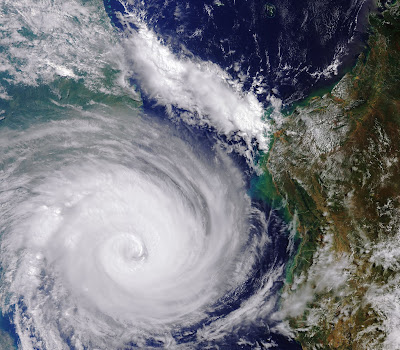The Forgotten Disaster - Cyclone Idai
Cyclone Idai is perhaps closer to my heart and mind than for others as I lived in Lilongwe, Malawi for a number of years and travelled throughout the region with my family.
Idai has proven to be one of the worst cyclones to hit Africa and the southern hemisphere.
Cyclone Idai - An anatomy of a disaster
In early March my Year 8 class were studying Tropical Storms and we had been watching https://earth.nullschool.net/ for signs of any storms. It is a lower ability class and liked looking for the patterns on the map and were becoming quite good at finding storms before they became officially named. We spotted Idai and traced it over the lessons in early March.
 |
| Cyclone Idai in the Mozambique Channel March 14 2019 |
Relief Web Malawi Food March 2019
But that was just the start of Idai.
 |
| Sea surface temperatures of over 29 degrees |
The Mozambique Channel which sits between Madagascar and Mozambique is very deep, with depths of over 3000m. It is also very warm with sea surface temperatures in March 2019 of over 29 degrees Celcius.
This part of the Indian Ocean lies between 10 and 20 degrees south of the equator. So there are perfect conditions for cyclones to form. The sea surface temperature is warm enough, the ocean is deep enough and the Coriolis effect deflects the storm southwards and causes it to spin in clockwise direction. Low wind shear kept the cloud together.
 |
| Cyclone Idai March 3 to 12 |
Cyclone Idai brushed north western Madagascar causing heavy sea conditions and up to 400mm of rainfall in some areas. The torrential rain triggered mudslides and landslides, killing 1 person and causing widespread damage to homes, hospitals and schools. Electricity and phone lines were damaged or destroyed.
Idai barrelled towards the Mozambique coast and on the night of the 14th March 2019 Idai made landfall at Beira, the 4th largest city in the country with a population of over 500,000.
Idai blasted into the coast as a Cat 2 storm with wind speeds up to 180kph and a storm surge up to 4.5m and rainfall of over 600mm in some places. 1.7 million people lay in its path in Mozambique and 920,000 people were affected in Malawi.
Mozambique
“It is a real disaster of great proportions,” said President Filipe Nyusi of Mozambique, according to The Associated Press.
The weather hazards and storm surge destroyed 90% of Beira and flooding up to 10m spread inland over 100 miles.
An 'inland sea' was created that was 50km wide covering fields and villages.
Idai has caused at least 600 deaths. Thousands of homes have been damaged or destroyed as well as hospitals and schools. infrastructure has also been extensively damaged, such as roads, railways, bridges and communications.
Doctors Without Borders / Medecins Sans Frontier (MSF) have immunised over 800,000 people against Cholera and treated 3,400 patients with the disease. Cholera spreads quickly in crowded towns such as Beira.
 |
| Flooding Mozambique |
In the town of Buzi, south of Beira, 7m of flood water engulfed the town. MSF provided a Cholera clinic, as well as other health facilities focusing on maternal health and HIV treatment, which is prevalent in this region. Essential hygiene products like soap and clothes washing detergent have been welcomed. As soon as they were handed out fresh washing was seen on lines and one woman was very pleased as she had not been able to wash her clothes for 3 weeks since the cyclone hit. Education and counselling have been set up, so that people can be educated about the importance of good hygiene as well as how the trauma from the flooding and cyclone damage can affect them psychologically. The UN have appealed for US$40.8 million to provide critical emergency relief to the people in Idai's path.
Malawi
In Malawi, according to ACAPS (a Norwegian based NGO) 56 people died and 125,000 people have been displaced. Rainfall has continued throughout March and into April so prolonging the flooding in the Central and southern districts of Malawi. This increases the risk of diseases such as Cholera and food insecurity as a result of the destruction of food supplies and crops.
Food insecurity has greatest impacts on children; as 40% of under 5s already suffer from stunted growth due to malnutrition.
Some people who have been displaced were still without shelter and adequate washing facilities, so this was seen as a priority, particularly for the vulnerable, such as women and children. Women need shelter as they may be exposed to gender based violence if sleeping out in the open.
2 HEP plants were damaged on the Shire River and this has led to a reduction in power supply.
Zimbabwe
On March 16th Idai made its last stand in eastern Zimbabwe, impacting the communities of Chimanimani and Chipinge. Homes were flattened and and flooded. 344 people lost their lives, 250,000 people have been affected in this region and 16,000 households were displaced.
Is this to be expected with climate change?
Cyclones in this region are not uncommon, but this is the 7th significant storm in the Indian Ocean this season, which is double the norm. In the longer term there have been less cyclones in this region, but those that have occurred have been more intense. Combine this with sea level rise it is the low lying poorer coastal areas that will be hardest hit.
Links




No comments:
Post a Comment